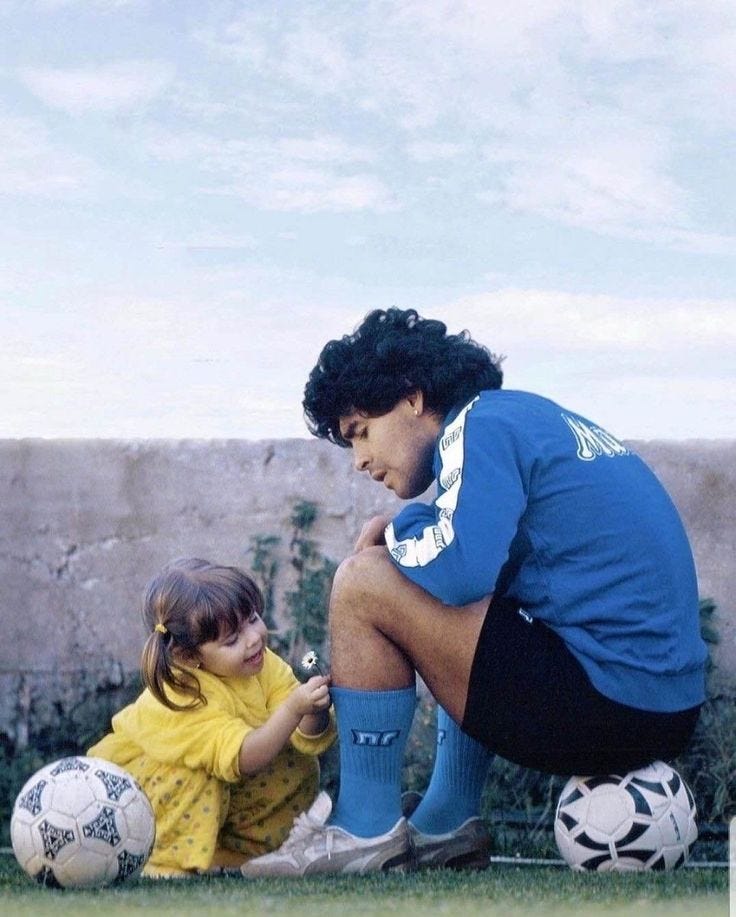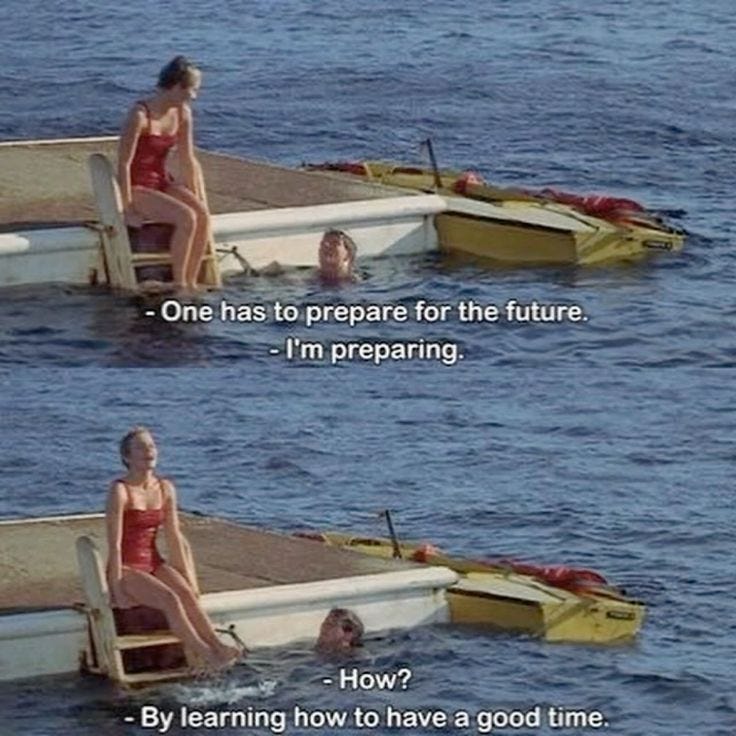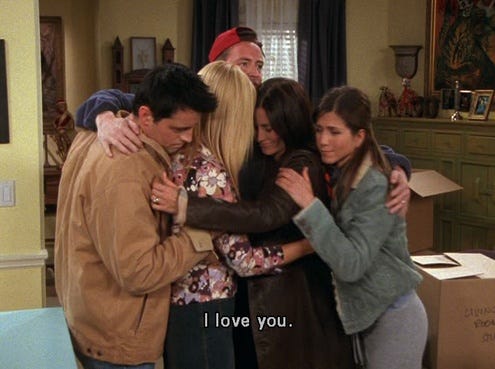Hi Move Fast, Think Slow Readers! MF/TS is a newsletter focused running (my nerd passion), performance, culture, and advertising written by an optimistic ad exec (that’s me). If you have not yet subscribed, join 100+ smart, curious humans by subscribing here.
In the last dispatch we gave you praise for showing up last year, surfaced the top three most popular MF/TS newsletters, and gave advice on how to think through New Year’s resolutions. Check it out if you missed it. To summarize: KEEP UP THE GREAT WORK!
THIS WEEK WAS HARD
This was a real hard week. As someone born in Los Angeles who still has so many friends who are directly dealing with the wildfires my heart weighed heavy. I had trouble sleeping. Anxiety swirled around me. My heart goes out to everyone who has lost their homes, their lives forever disrupted, and the road they go down next different than any other road they’ve been down before.
When I first thought of and wrote this dispatch the LA wildfires were not yet a reality. But, what is strikingly timely is that part of this piece tackles the world the wildfires call for us to embrace in a very direct way. We are absolutely in different waters where everything has changed, and the world we once knew is slowly diminishing away towards something else.
HOLD ON TIGHT/YOU ARE NOT ALONE
It feels like the waters of the world are, and will continue to be choppy. Without fully realizing it, I look to grab a hold of a tangible object to regain my stability. What is going on? What is happening? Where do we go from here?
Two recent pieces gave me some stability in seeing this present moment, helping me orient myself for the here and now and what’s to come. Ted Gioia and Rosie Spinks share cultural observations that clarify the current moment. Clarity can be a source of relief. Well, now I know why these waters are so darn choppy. Or at bare minimum, I’m not the only one that feels like this boat ride has gotten erratic and strange. There can be some comfort found there.
And with that, let’s dive in.
WATCH OUT ABOVE + HERE VS. THERE
Ted Gioia is proving to be one of the most insightful writers, thinkers, and cultural observers of our moment. This article on Dopamine / Distraction culture got shared far and wide. It hit the nail on the head on where the arts and entertainment industries are at. The summary: technology has taken over the arts/entertainment spheres, and now no one has the time/patience/environment to experience culture i.e. sit through a deep experience. Read the article for his thoughts (if you have patience LOL) or just look at this brilliant infographic to get his point.
We’re not here to discuss that piece, but another one Ted surfaced insights from a philosopher in the 1920s that prove relevant in 2025. In a separate piece that he wrote in 2022 and reposted just after the 2024 U.S. Election Ted shined a light on cultural insights between the “elites” and the “masses” that illustrate the status quo within our culture today:
Ortega was shocked. Put simply, the masses hate experts. If forced to choose between the advice of the learned and the vague impressions of other people just like themselves, the masses invariably turn to the latter. The upper elites still try to pronounce judgments and lead, but fewer and fewer of those down below pay attention.
Ted goes on to share 15 fascinating (and precise) observations of “the emerging vertical dimensions of the cultural conflict. All of them are very good but one really captured the essence of what Ortega was talking about / what Ted is observing in the conflict of the “ups” versus the “downs”:
The essence of down-versus-up is that a numerically large group of dissenters focus their anger on a small number of elites whom they view as antagonists, perhaps even evil villains. These Down movements cut across left-versus-right political ideologies, and thus encompass seemingly incompatible groups such as Occupy Wall Street, the truck convoys, Black Lives Matter, the Tea Party, ANTIFA, cryptocurrency fanatics, and a host of other cohort groups in the news. In every instance, these groups have proven capable of mobilizing intense energy among members—much greater energy than the Ups can ever hope to match. Participants seem to appear out of nowhere, leaping almost instantaneously into action.
The energy described in that last sentence feels like what we are seeing in our news headlines every week. But if you’re paying attention, as Ted is in this piece, none of this should be a surprise. It’s only a surprise if you adhere to and follow everything the “ups” (i.e mainstream information resources / i.e. the elite agenda) project into the world.
Another fascinating and very true observation:
Media platforms associated with Ups are losing energy. This is why award shows, to cite one example, have such a small and dwindling audience (down by 70-80% over the last decade). The very concept of an award show is tainted by its image of elites giving prizes to other elites. To maintain relevance, the award shows must take on a veneer of Down—which they work assiduously to cultivate (e.g., the People’s Choice awards)—but few in the audience are convinced. No award show will ever genuinely placate the Down constituencies
Ted’s 15 observations are connected to Martin Gurri’s Revolt of the Public, a book I reviewed on MF/TS a few years ago (one of the most popular MF/TS posts). In his book, Martin argued digital networks aka the internet/social media will subvert modern institutions and governments. His argument was that as Governments continue to fall short of the people’s expectations, nihilistic mobs can and will sprout up, and at times manifest itself physically in real life. We’ll come back to Martin’s take on what comes next in a moment.
“To be collapse aware" is to live with the sense that something about the way we live is coming to end.
How do we orient ourselves in this future world? Rosie Spinks wrote a fascinating essay that offers us a lens to see where we are currently sitting: at the precipices of an uneven, disjointed process that we’ll all continue to experience together.
“To be collapse aware" is to live with the sense that something about the way we live is coming to end. And then to ask the next obvious question head on: If the incrementalist approach of our existing political and economic structures is not up to the task of improving things – climate, society, inequality, injustice – what comes next?”
At the heart of her essay lies a simple framework that captures the dual reality that all of us inhabit: There and Here.
“There is where I earn a living, and it’s where I have a mortgage, and order groceries for pickup. It’s where growth is uniformly seen as good, and we’re told that social problems have to be ameliorated while still upholding shareholder value... It’s a place where most of us are very burned out, in a manner that mirrors the exhaustion of the earth.”
Meanwhile, “Here is where I’ve internally accepted that infinite progress and wealth are not inevitable... Where life is less concerned with status, and more with sustenance. It’s a place where the entire economy is not based on getting consumers exactly what they want, where cheap flights and next-day delivery are not available... Where we adjust our lives accordingly, and rely on one another by necessity, rather than forging ahead pretending that everything is fine.”
What made this so refreshing is that I never see any writing that admits we are now living in a disorienting, uncomfortable “there” and “here” reality all of the time. And that it doesn’t necessarily mean “the sky is falling and the world is finished” but more so the world is rapidly changing. Yes, that means something is coming to an end. Yes, climate change will continue to force us to rethink how and where we live. Yes, it will be challenging but it doesn’t mean anything is over.
It feels like we are approaching the end of a specific social contract. Modernity is a project founded on patriarchal domination, on linear time, infinite extraction and unstoppable accumulation. In its five centuries, it has evolved into such an unnatural paradigm that it now only survives through extreme and perpetual violence; perpetrated indifferently against both humans and non-humans alike.
The modern project is coming to an end? Or perhaps it’s about to become something entirely different.
As the stoics say: we have a choice! And to acknowledge this, and do something about it means we can choose to take part in defining how this new world can work. As Rosie says at the end of her piece and as Kai Branch encapsulates her point perfectly:
Rather than a catastrophe to fear, collapse awareness becomes an invitation to reassess our relationships with consumption, community and care. As we enter a season typically marked by excess, perhaps there’s wisdom in pausing to consider how we might begin moving from There to Here – not in fear or resignation, but in somewhat hopeful recognition that different ways of living and connecting await our discovery.
Here is a link if you want to go deep on Rosie’s essay. Or you can review Kai Branch’s summary of the essay on Dense Discovery here.
And here is to discovery and holding (and fighting for) hope.
KEEP THE FAITH (& GET INVOLVED)
The world is changing, but that doesn’t mean you should fall into despair. I call for you to hold out for hope, and know and believe in it. It’s a noble act to be hopeful. And it might make a huge difference not only in your life but also in your future.
I share this quote from Rebecca Solnit:
“Hope locates itself in the premises that we don’t know what will happen and that in the spaciousness of uncertainty is room to act. When you recognize uncertainty, you recognize that you may be able to influence the outcomes — you alone or you in concert with a few dozen or several million others. Hope is an embrace of the unknown and the unknowable, an alternative to the certainty of both optimists and pessimists. Optimists think it will all be fine without our involvement; pessimists take the opposite position; both excuse themselves from acting. It’s the belief that what we do matters even though how and when it may matter, who and what it may impact, are not things we can know beforehand. We may not, in fact, know them afterward either, but they matter all the same, and history is full of people whose influence was most powerful after they were gone.”
Now I don’t know about you. But hope sure sounds like something worth fighting for.
BUT DIDN’T YOU SAY THIS NEWSLETTER WAS ABOUT OTHER THINGS? 👀😂
Yes, I did! Does this have anything to do with advertising and marketing? It absolutely does. A big reason I’ve been thinking about these two pieces a lot is it’s having me ask, if this is all true, then what does that mean when it comes to the opportunity companies have to connect with people and make products that actually impact people’s lives? Those are the types of questions to ask if you’re looking to create words, art, and communication devices to pull people into your orbit. The are so many answers here. We’ll save that for the next time we drop into your inbox. For now, thank you for coming along for the ride.
IMAGES OF THE WEEK

Go forth.
Stay safe.
Ride the wave.
-Mitch







